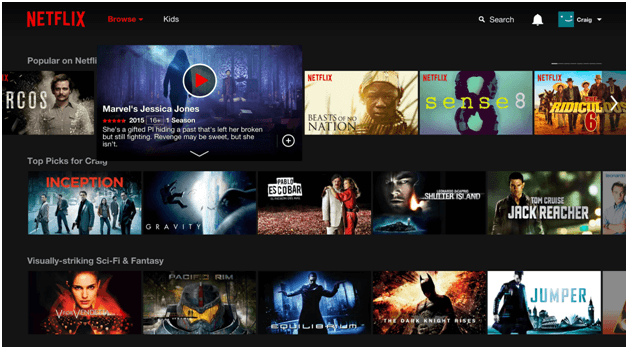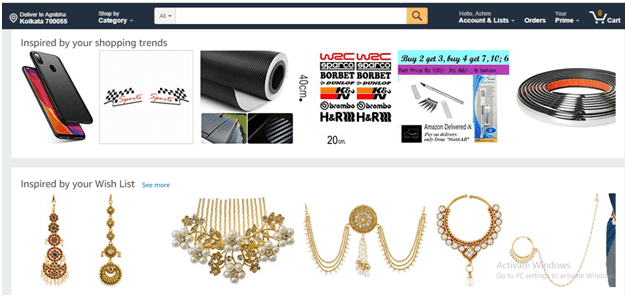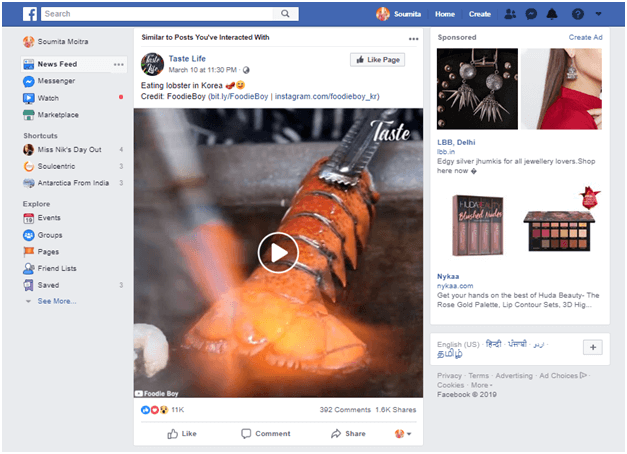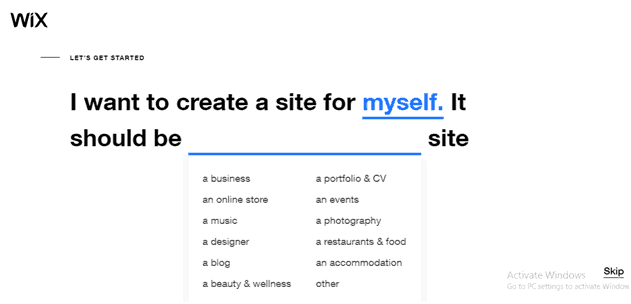In today’s consumer-driven market, a one-size-fits-all marketing strategy rarely works. Consumers are flooded with a number of options for every basic need.
Which means that connecting with your target audience can become extremely challenging. An effective way of grabbing their attention is to customize your marketing efforts.
Your website is one of the most powerful marketing tools your brand has. It is not just a channel to showcase important information about your products or services.
It can help you build brand awareness and credibility. And a well-designed website can help you generate leads and convert them into loyal customers.
A website, being such an integral part of your marketing strategy, is a great opportunity for personalization.
Website personalization has been a highly debated topic recently, partially because of its relative complexity. However, when executed correctly, it offers a number of lucrative advantages for brands and website owners.
In fact, it can help you win more loyal customers and speed up the sales process.
However, before we discuss the benefits of website personalization, let’s first take a look at the concept in greater detail.
Table of Contents
Understanding Website Personalization
Imagine a hypothetical scenario in which you are visiting an online retail store to buy a pair of socks. Wouldn’t it be great if the website could read your mind and recommend socks from different brands?
But how would you feel if the homepage showed recommendations for handbags when you are looking for socks? Annoying? Frustrating?
That is exactly where website personalization can help.
In simple terms, website personalization is the process of customizing the overall experience for each visitor on your website.
It relies on data collected from past website interactions and other demographics related to your target audience. This includes data related to their location, devices used, browser language, and online behavior.
Website Personalization Examples
A personalized website allows you to deliver a unique experience to each user, based on their distinct preferences. Let’s look at some examples to understand website personalization better.
Netflix
Netflix, the popular online streaming platform, uses website personalization to recommend TV shows and movies. It utilizes your viewing history to suggest movies you are likely to enjoy.
The website even indicates to what extent a particular suggestion matches your tastes based on your genre interests. It is because of such a tailor-made experience that users often spend hours on the platform.
Image via Netflix
It is important to mention here that Netflix often customizes the artwork of titles based on members’ interests and viewing habits. This leads to increased engagement and makes it easy for users to discover interesting content.
In addition, the data collected helps Netflix determine the fate of a movie or TV show even before its release. This has helped Netflix grow to become the world’s seventh largest internet company by revenue.
Amazon
Another popular example of website personalization is presented by Amazon. Once you have visited the website a couple of times, it shows product recommendations based on your browsing history.
Let’s say you previously looked for baking tools on the website. On your next visit, you will find the homepage filled with recommendations of different tools and utensils you might need for baking.
Image via Amazon
It is interesting how Amazon uses your purchase history and online behavior to suggest products that might be useful for you.
In addition to improving the overall user experience, website personalization allows Amazon to showcase products that may have otherwise gone unnoticed. It is not surprising that Amazon ranks second on the list of world’s top 10 internet companies.
You can also take the example of Facebook to understand how they utilize website personalization.
The social networking giant is constantly tweaking your News Feed to deliver content that will intrigue you. That is why you keep getting suggestions such as, “Videos You May Like” and “Pages You May Like.”
Image via Facebook
The most obvious advantage for Facebook users is that they get access to interesting content according to their tastes and sensibilities. However, that is not the only reason Facebook works so hard to personalize your News Feed.
A customized News Feed ensures that users spend more time glued to their devices, giving Facebook ample scope to display ads. This, in turn, helps the platform earn increased revenue.
Common Types of Website Personalization
Now that we have a basic idea about what website personalization is, let’s look at a few ways in which you can use it.
Content Recommendations
Typically, this type of website personalization involves showing relevant content to users so that they continue to interact with your website. This requires data about a user’s previous interactions with your website.
The previously cited examples of Netflix and Facebook use content recommendations to retain visitors on their platform. These websites may also utilize a user’s personal information to tailor their recommendations even further.
Let’s say you own a blog that publishes a variety of content from current affairs and news to travelogues. A visitor who is interested in the latest news may not enjoy a detailed account of the best hiking trails in your city.
It is crucial to showcase the right content to the right audience, based on how they interact with your website. That’s what website personalization is all about. This can help improve engagement and ultimately improve website metrics such as dwell time.
Product Recommendations
This is the most common form of website personalization used by ecommerce businesses. It allows you to showcase relevant and recent products based on a user’s purchase history.
It also takes into account the way in which the user interacts with different products on your website. This makes it easier for the user to locate products they may want to purchase.
The most important advantage of this website personalization technique is that it lets you identify the products that a user is likely to purchase. Recommending them at the right time can help you close a deal much faster. This leads to increased revenue and ultimately the ROI of your website gets a boost.
Contextual Messaging
Website personalization enables you to interact more effectively with your users.
Let’s say a user is visiting your website for the third time. Do you want to display a popup asking them to sign-up for your weekly newsletter?
They may have already done that during their previous visits. By their third visit, they are likely looking for more information about your product or service.
It makes more sense to ask if the user would like to schedule a product demo or download an ebook. Website personalization helps you communicate effectively with users in different stages of the buyers’ journey.
You can become more helpful to users and guide them through your website. In a nutshell, website personalization will help you convert them into paying customers with greater ease.
Predictive Navigation
You can’t expect a user to navigate your entire website to find what they are looking for. It is up to you to simplify the navigation process and make it easy for users to locate relevant information.
This becomes particularly challenging when you have a plethora of content or products to showcase.
However, with website personalization, you can control the way a user journeys through your website based on their browsing history.
You can determine what page a user may want to visit next by analyzing their previous interactions with your website. This can prevent them from leaving your website before they find what they were looking for.
Website Personalization: Why is it Important?
It is evident that website personalization helps deliver an enhanced user experience to every user. However, if you are a marketer or website owner, it can help you accomplish more than just that.
Tailor-Made Calls-to-Action
Calls-to-action (CTAs) are extremely crucial in determining how users navigate through your website. You can use them to influence the way users interact with your website and move through it.
However, a generic CTA may fail to engage with your target audience. On the other hand, personalizing your CTAs improves their performance by a whopping 202%.
Personalized CTAs are able to adapt based on whether or not a user is visiting your website for the first time. In addition, they can be modified according to a user’s location, time zone, and browser language.
This kind of website personalization improves user interaction and indirectly encourages them to spend more time on your website. It also empowers you to convert them into loyal customers in a more efficient manner.
Let’s say you own a digital marketing agency. A user who is visiting your website for the first time may want to learn about your company. You can show them a CTA to your “About Us” or “Services” page.
On the other hand, a visitor returning to your website for a second time may want to hire you. These users can be shown a CTA to request a free quote by submitting their requirements and contact information. Such a CTA enables you to collect user data and connect with them on a personal level.
Deeper Understanding of Your Audience/Customers
You can use personalized CTAs to request a variety of information from your website visitors at the right times.
For instance, when someone signs up on your website, you can ask them about their job title and the industry they work in. This data will help you segment your audience based on different parameters. This, in turn, will help you with website personalization even further.
Wix.com, the cloud-based website development platform, utilizes website personalization to understand what exactly a user is looking for.
When a new user signs up, they are taken through an optional step during which they can provide this information. This allows the platform to get insightful data about their customers.
Then, Wix.com is able to provide customized website templates based on this data.
Image via Wix
Improved Product Recommendations
Relevant product recommendations have the potential to increase conversion rates and contribute to sales. This is especially useful for ecommerce businesses.
You can also use personalized product recommendations to showcase products that a user may not have deliberately searched for.
Additionally, it can make your customers feel valued. It creates the impression of a brand that understands your customers and cares for them. This, in turn, strengthens brand credibility and trust.
Enhanced Customer Loyalty
Website personalization helps you connect and interact with individual users. Customizing your messaging and CTAs for different users makes them feel valued.
This leads to a higher level of satisfaction and trust and can turn them into loyal advocates of your brand.
For instance, you can display various offers to a user on their birthday. This makes them feel special and reinforces their trust in your brand.
They are more likely to recommend your brand in their own networks as well. Website personalization also plays a crucial role in your customer loyalty programs.
Reduce Follow up Emails
Does Netflix send you an email every time they add a new movie or TV show?
No.
Instead, they use personalized recommendations to highlight new content that might interest you.
Likewise, you can decrease the number of follow up emails you send by using website personalization.
Your website visitors indirectly tell you what kind of products or services they are looking for. You can segment them into different categories and send follow up emails to the most relevant ones.
Improved Website Performance
When users are able to locate relevant information, they are more likely to spend more time on your website. This, in turn, improves bounce rates and has an impact on the overall performance of your website. So, website personalization can have a direct impact on your website performance.
A high time-on-site value indicates your website engages visitors and perhaps, resolves their problems/queries. This can be crucial in determining your website’s rankings in the search engine results pages (SERPs).
Conclusion
A well-designed website is of no use unless it can help you earn more revenue.
However, with the sheer number of websites invading the online space, it is difficult to cut through the noise.
Website personalization is an effective way of grabbing the spotlight and connecting with potential customers.
A personalized website leads to increased conversion rates and delivers a better ROI. It also helps you develop a better understanding of your customers and further tailor your messaging for them.
It is heavily reliant on data collected from website visitors. You can use this data to control the way users navigate your website and influence the outcome of their visit.
What type of website personalization have you found to be most useful? Share your views in the comments section below.






Related Articles
What is Digital Marketing? Everything You Need to Know
Best Blogger Outreach Tool – 21 Tools to Minimize Your Outreach Efforts
33 Free Google Marketing Tools for Marketers and Developers
22 Best Online PR Tools to Build and Monitor Media Relations
Digital Marketing for Startups: The Strategies to Use in 2024